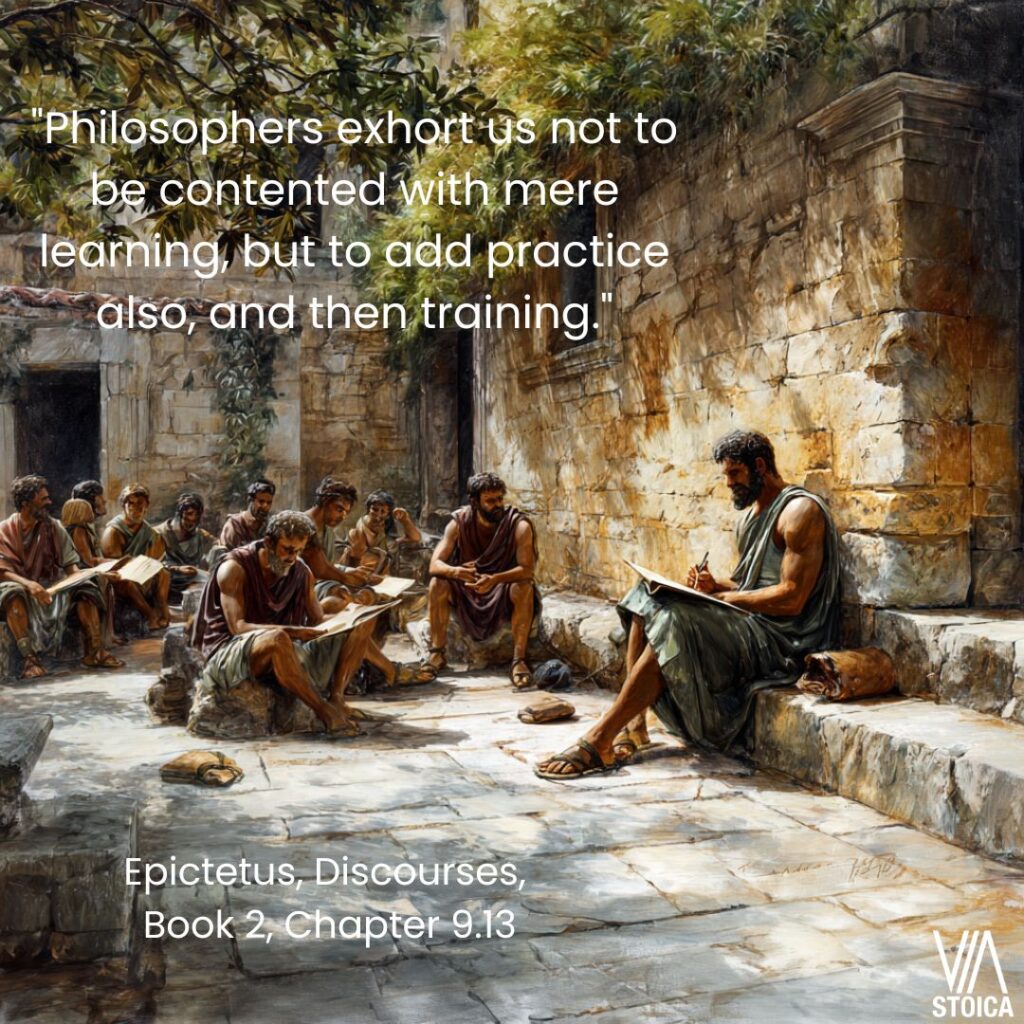Stoic Practice and Training: Why Epictetus Said Learning Alone Is Not Enough
“Philosophers exhort us not to be contented with mere learning, but to add practice also, and then training.”
Epictetus, Discourses, Book 2, Chapter 9.13

Epictetus cuts straight to the heart of philosophy: knowledge without practice is empty. For the Stoics, reading and studying were never enough. What matters is what you do with what you learn. The path to wisdom requires three stages: learning, practice, and training, each one building on the last.
Learning gives us concepts and principles, the raw material of wisdom. Practice is where those ideas are tested in the real world, in conversations, frustrations, and daily decisions. Training is what comes after repeated practice, when habits are formed, and the mind is conditioned to respond with reason rather than impulse. Epictetus urges us to see philosophy as a progression: from knowing, to doing, to becoming.
Looking for ways to practice Stoicism: start here
In today’s world, where it is easy to consume endless information without changing anything in our lives, this message is especially relevant. The lesson of stoic practice and training is that wisdom becomes real only when you act it out daily, turning insights into habits and habits into character. It’s not about the amount of books you’ve read or the inspirational videos you’ve consumed; it’s about how you put them to use in your life.
Practical reflections or insights
- Move from theory to action
When you read a Stoic text or hear a powerful quote, do not just nod in agreement. Choose one small way to apply it today. This could be pausing before reacting, reflecting before speaking, or reminding yourself what lies within your control. - Create consistent training
Just as athletes improve through repetition, the Stoic trains the mind by revisiting the same principles daily. Meditation, journaling, or practicing premeditatio malorum are ways to strengthen resilience and prepare for challenges. - Seek feedback and correction
Epictetus reminded his students that progress requires humility. Working with a teacher, coach, or even a trusted friend helps reveal blind spots and keeps your Stoic practice and training grounded in reality.
Philosophy was never meant to be abstract. Epictetus shows us that transformation lies not in what we know, but in what we repeatedly do.
FAQ
What does Stoicism say about practice and training?
Stoicism teaches that philosophy must go beyond study. It becomes meaningful only when practiced daily and reinforced through disciplined training.
How can I apply Stoic practice in daily life?
Start with small, deliberate actions such as journaling, reframing challenges, or practicing acceptance. Repetition makes these habits part of your character.
Why is training emphasized by Epictetus?
Because only training creates consistency. Just as an athlete builds strength, the philosopher builds resilience by practicing principles until they become second nature.
Want to explore more Stoic strategies?
Book a free consultation with one of our Stoic Coaches or read more on the Epictetus Quotes page. You can also listen to the Via Stoica podcast on Spotify or Apple Podcasts or watch it on YouTube.
Author Bio
Benny Voncken is the co-founder of Via Stoica, where he helps people apply Stoic philosophy to modern life. He is a Stoic coach, writer, and podcast host of The Via Stoica Podcast. With almost a decade of teaching experience and daily Stoic practice, Benny creates resources, workshops, and reflections that make ancient wisdom practical today.
Related Posts
-
 Inner Life Terms
Inner Life TermsWhat Are Values? Principles That Guide Action and Display Nature
What are Values? Most people don’t wake up thinking about their values. They notice them indirectly, when something feels slightly misaligned. When a choice looks right on paper but leaves a faint sense of resistance. When success arrives, yet doesn’t land the way it was expected to. Values are often mistaken for opinions, preferences, or […]
Read more -
 Via Stoica Podcast
Via Stoica PodcastA Stoic Conversation with Jason Nelson: Six Seeds for a Happier Life
What if happiness is not something you achieve one day, but something you practice every day? In A Balm for Your Soul: Six Seeds for Happiness, Jason Nelson offers a grounded and humane answer to a question many people quietly struggle with: Why does life still feel off, even when things look good on paper?Rather […]
Read more -
 Greek Stoic Philosophy Terms
Greek Stoic Philosophy TermsWhat Is Philanthropia? How Stoicism Views Love for Humankind
What Is Philanthropia? Philanthropia in Stoicism is the cultivated disposition to care for human beings simply because they are human. It describes a rational, practiced goodwill toward others that flows from understanding our shared nature, rather than from emotion, obligation, or reward. This concept matters today because modern life often treats kindness as optional, sentimental, […]
Read more


Comments 0